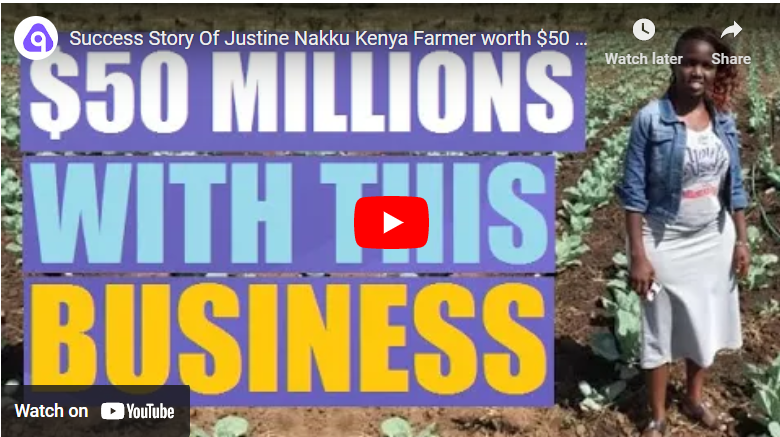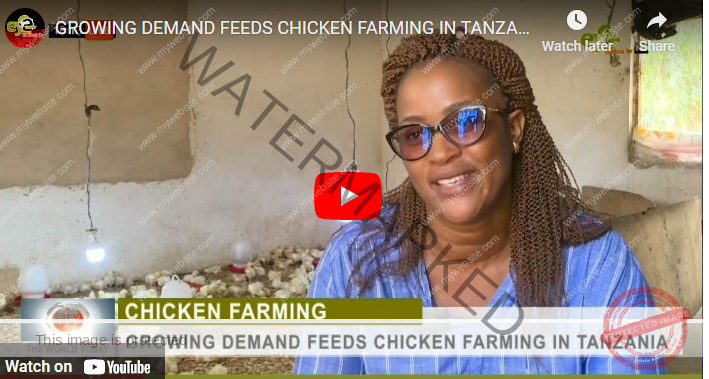Zambia is a landlocked country in Southern Africa that is renowned for its vast agricultural potential. Agriculture has been the backbone of Zambia’s economy for decades, with the majority of the population relying on it for their livelihoods.
Over the years, some farmers in Zambia have excelled in the agricultural sector, accumulating wealth and becoming some of the richest farmers in the country. These farmers have implemented innovative farming techniques, invested in modern equipment and machinery, and diversified their crops, leading to increased productivity and profitability.
Some of the richest farmers in Zambia include Maria Zaloumis and Frances and Dorothy Arnold.
Most Successful Farmers In Zambia
Kenya’s poultry industry has been growing rapidly in recent years, thanks to the efforts of successful farmers who have invested in modern farming technologies and sustainable practices.
Among these farmers are Maria Zaloumis, who is considered to be some of the richest and most successful poultry farmers in Kenya.
Read Also: Richest Poultry Farmers In Uganda [Top 6 Ranked]
#1. Maria Zaloumis
Maria Zaloumis is a well-known entrepreneur and farmer in Zambia. She is the founder of Zambeef Products, one of the largest integrated agribusinesses in Zambia.
Zambeef is a vertically integrated company that produces and processes meat, dairy, and other food products.
It has a network of retail outlets across Zambia and exports its products to other African countries.
Zaloumis was born in Zambia in 1956 and started her career in the banking sector. She later joined her husband in running their family farm and eventually started Zambeef in 1994.
Read Also: Top 5 Richest Dairy Farmers In India
Under her leadership, Zambeef has grown rapidly and has been listed on the London Stock Exchange’s AIM market since 2011.
According to Forbes, Zaloumis has an estimated net worth of $2 million, making her one of the wealthiest farmers in Zambia.
#2. Frances and Dorothy Arnold
Frances and Dorothy Arnold are a mother and daughter farming duo based in Zambia. They both have a lengthy experience in farming, and they have been able to establish themselves as one of the leading farming families in Zambia.
Read Also: Top 5 Richest Diary Farmers In Kenya
Frances and Dorothy own and operate a large grain farm in Zambia. The farm is located in the heart of Zambia’s farming region, where the soil is fertile and the weather conditions are ideal for growing crops.
The duo primarily grows maize, wheat, and soybeans on their farm.
Frances and Dorothy are known for their innovative farming techniques, which have allowed them to increase crop yields and reduce production costs.
Read Also: Top 5 Richest Diary Farmers In South Africa
They have also implemented sustainable farming practices, which have helped to minimize their environmental impact.
Their farming success has not gone unnoticed. In 2018, Frances and Dorothy were recognized by the Zambian government for their outstanding contribution to the country’s agriculture sector.
The Systems Used by the Most Successful Farmers in Zambia
Zambia has several farming systems, including subsistence farming, commercial farming, and agribusiness.
Read Also: Top 10 Richest Diary Farmers In The World
Successful farmers in Zambia often use a combination of these systems to maximize their profits.
- Subsistence farming: This is the most common type of farming in Zambia, with over 70% of the population engaged in it. Subsistence farmers grow crops for their own consumption and for sale in local markets. Successful subsistence farmers often use traditional farming methods and rely on indigenous knowledge of crop production.
Read Also: Top 12 Richest Farmers In Australia
- Commercial farming: This type of farming involves large-scale production of crops and livestock for sale in local and international markets. Commercial farmers in Zambia often use modern farming methods and equipment to increase their yields and profits. Successful commercial farmers also invest in research and development to improve their crops and livestock.
Read Also: Top 10 Richest Farmers In Africa
- Agribusiness: This is a business that involves the production, processing, and marketing of agricultural products. Successful agribusiness farmers in Zambia often specialize in a particular product or value chain, such as dairy farming, poultry farming, or horticulture. They also invest in value addition to their products, such as processing and packaging, to increase their profits.
Read Also: Top 5 Richest Famers In America
Profitability in Farming
Farming in Zambia can be profitable, but it requires careful planning, management, and investment. Several factors affect profitability in farming, including:
- Access to finance: Most farmers in Zambia face challenges in accessing financing to purchase inputs and equipment. Successful farmers often have access to credit facilities or other forms of financing that allow them to invest in their farms.
- Quality of inputs: The quality of inputs such as seeds, fertilizers, and pesticides can significantly impact crop yields and profits. Successful farmers invest in high-quality inputs and use them judiciously to maximize their yields and profits.
Read Also: Top 5 Richest Farmers In Ghana
- Market access: Access to local and international markets is critical for profitable farming in Zambia. Successful farmers often have established relationships with buyers and distributors and are able to negotiate favorable prices for their products.
Successful Strategies of the Wealthiest Farmers in Zambia
Wealthy farmers in Zambia often use a combination of strategies to increase their profits and sustain their businesses. These strategies include:
- Diversification: Successful farmers often diversify their crops or livestock to minimize risk and take advantage of market opportunities. They also invest in value addition to their products, such as processing and packaging, to increase their profits.
Read Also: Top 10 Richest Farmers In India
- Innovation: Successful farmers in Zambia often invest in research and development to improve their crops and livestock. They also use technology and modern farming methods to increase their yields and efficiency.
- Collaboration: Successful farmers often collaborate with other farmers, researchers, and organizations to share knowledge and resources. This allows them to access new markets, technologies, and financing opportunities.
Key Factors Influencing Farming in Zambia
Several factors influence farming in Zambia, including:
- Climate and weather patterns: Zambia has a tropical climate with two main seasons – the rainy season and the dry season. Climate change and weather variability can significantly impact crop yields and profits.
Read Also: Top 10 Richest Farmers In Ireland
- Access to resources and inputs: Limited access to resources such as land, water, and inputs such as seeds, fertilizers, and pesticides can limit farming productivity in Zambia.
- Government policies and support: Government policies and support can significantly impact farming in Zambia. Policies that support smallholder farmers and promote sustainable farming practices can improve productivity and profitability.
Read Also: Top 10 Richest Farmers In Kenya
Challenges in Farming
Farming in Zambia faces several challenges, including:
- Climate change and weather variability: Climate change and weather variability can result in crop losses, soil degradation, and reduced yields.
- Pest and disease control: Pests and diseases can significantly impact crop yields and profits, especially for smallholder farmers
- Limited access to finance: Most farmers in Zambia face challenges in accessing financing to purchase inputs and equipment. This limits their ability to invest in their farms and improve their yields and profits.
Read Also: Top 5 Richest Farmers In South Africa
- Limited access to markets: Many farmers in Zambia face challenges in accessing local and international markets, which limits their ability to sell their products at favorable prices.
- Poor infrastructure: Poor infrastructure, including inadequate road networks, power supply, and storage facilities, can limit farmers’ ability to transport and store their products.
Optimal Approaches for Farming
To overcome the challenges and achieve profitability in farming, farmers in Zambia can adopt several optimal approaches, including:
- Climate-smart agriculture: This approach involves using sustainable farming practices that are resilient to climate change and weather variability. These practices include crop diversification, water conservation, and soil management.
Read Also: Top 12 Richest Farmers In The World
- Value addition: Farmers can increase their profits by adding value to their products through processing, packaging, and branding. This allows them to sell their products at higher prices and access new markets.
- Access to finance: Farmers can improve their access to financing by forming cooperatives or joining existing ones. They can also explore financing options such as grants, loans, or equity investments.
- Access to markets: Farmers can improve their access to markets by forming partnerships with buyers, distributors, and other stakeholders in the value chain. They can also explore online marketing platforms to sell their products directly to consumers.
Read Also: Top 5 Richest Goat Farmers In Uganda
- Knowledge and skills development: Farmers can improve their knowledge and skills through training and capacity building programs. This allows them to adopt new technologies and best practices that can improve their productivity and profitability.
- Policy advocacy: Farmers can advocate for policies that support sustainable agriculture and promote their interests. This includes policies that support smallholder farmers, improve access to resources and inputs, and promote market access.
List Of Commercial Farmers In Zambia
Zambia is a country in Southern Africa known for its vast natural resources, including fertile land suitable for agriculture. Commercial farming is one of the most lucrative agricultural practices in Zambia, and it involves large-scale farming with the primary aim of generating profits.
Here is a list of commercial farmers in Zambia:
Zambeef Products PLC
Zambeef Products PLC is one of the largest agribusinesses in Zambia, operating in the beef, chicken, pork, milk, and eggs sectors.
The company is involved in the entire value chain, from farming and processing to distribution and retail. Zambeef has a network of over 160 retail outlets across Zambia, and it exports its products to other African countries.
The company was founded in 1994 and has since grown to become a significant player in the Zambian agriculture sector.
Read Also: Top 5 Richest Goat Farmers In Uganda
Agriserve Agro
Agriserve Agro is a subsidiary of Agriserve Zambia Limited, a Zambian-owned agribusiness that operates in the seed, fertilizer, and agrochemicals sectors.
Agriserve Agro specializes in large-scale commercial farming, focusing on maize, soybeans, and wheat.
The company has over 10,000 hectares of farmland in Zambia, and it uses modern farming technologies and sustainable practices to maximize yields and profits.
ZANACO Agribusiness
ZANACO Agribusiness is a subsidiary of Zambia National Commercial Bank (ZANACO), one of the largest banks in Zambia.
The company is involved in large-scale commercial farming, focusing on maize, soybeans, and other crops.
ZANACO Agribusiness has over 3,000 hectares of farmland in Zambia, and it uses modern farming technologies and practices to ensure high yields and profitability.
African Green Resources
African Green Resources is a Zambian-owned agribusiness that operates in the seed, fertilizer, and farming sectors.
The company specializes in large-scale commercial farming, focusing on maize, soybeans, and other crops.
African Green Resources has over 15,000 hectares of farmland in Zambia, and it uses modern farming technologies and sustainable practices to ensure high yields and profitability.
Zamseed
Zamseed is a Zambian-owned seed company that specializes in the production and distribution of certified seed varieties.
The company is involved in large-scale commercial farming, focusing on maize, wheat, and soybeans.
Zamseed has over 4,000 hectares of farmland in Zambia, and it uses modern farming technologies and practices to ensure high yields and profitability.
Chayton Capital
Chayton Capital is a private equity firm that invests in the agriculture sector in Africa.
The company has invested in several large-scale commercial farming projects in Zambia, including a 10,000-hectare farm that produces maize, soybeans, and wheat.
Chayton Capital partners with local farmers and agribusinesses to increase productivity and profitability in the agriculture sector in Zambia.
Conclusion
The richest farmers in Zambia serve as an inspiration and a symbol of hope for the agricultural sector. Their success is a testament to the potential of agriculture in Zambia and the impact of innovation, diversification, and investment in modern technology.
By emulating their practices and supporting their endeavors, Zambia’s agricultural sector can continue to grow and thrive, contributing to the country’s economic development and poverty reduction efforts.



